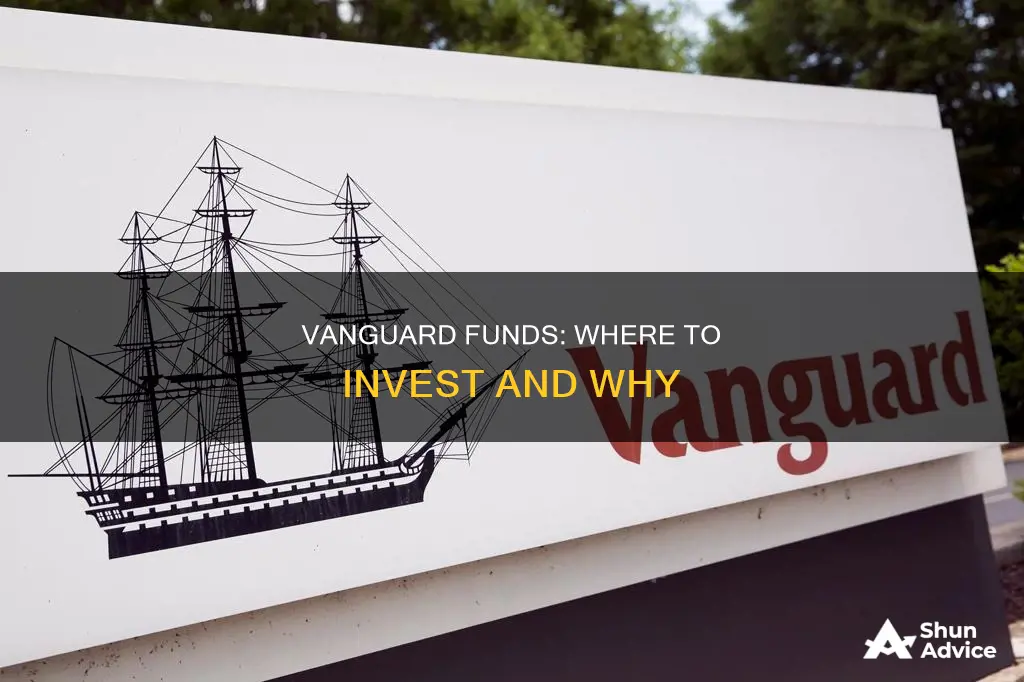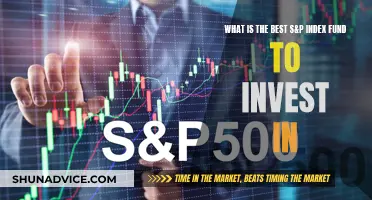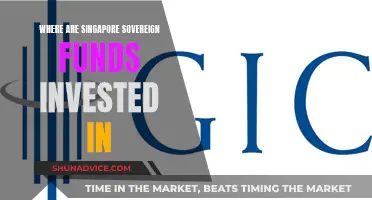
Vanguard is a popular choice for investors, offering a wide range of investment products, including mutual funds, exchange-traded funds (ETFs), stocks, and more. With over $7 trillion in assets, Vanguard is a dominant player in the mutual fund and ETF landscape in the United States. The company has built its reputation on offering low-cost investment options, with fees significantly lower than the industry average. Vanguard's funds are known for their simple, reliable strategies, often mirroring market indexes like the S&P 500 or Nasdaq. This passive investing approach has proven profitable for investors over time, as markets tend to rise, and Vanguard's low fees allow investors to retain more of their money.
Vanguard offers a variety of funds to choose from, including index funds and actively managed funds. Index funds aim to match the performance of a specific market index, capturing the overall market gains. Actively managed funds, on the other hand, are handpicked by fund managers who attempt to beat the market returns. Vanguard's funds cover various asset classes, including US stocks, international stocks, and bonds, providing investors with the flexibility to build well-diversified portfolios that match their investment goals and risk tolerance.
Some popular Vanguard funds include the Vanguard Total Stock Market Index Fund Admiral Shares (VTSAX), Vanguard 500 Index Fund Admiral Shares (VFIAX), and Vanguard Total International Stock Index Fund Admiral Shares (VTIAX). These funds offer exposure to a broad range of domestic and international stocks, providing investors with a simple and cost-effective way to diversify their portfolios.
In summary, Vanguard's investment funds are a popular choice due to their low costs, reliable strategies, and diverse investment options. Whether you're a beginner or an experienced investor, Vanguard offers a range of funds to help you build a robust and well-balanced investment portfolio.
| Characteristics | Values |
|---|---|
| Low-cost | Yes |
| Instant diversification | Yes |
| Passive investing | Yes |
| Broad market indexes | Yes |
| Low turnover | Yes |
| Top-rated | Yes |
| Gold Morningstar Medalist Rating | Yes |
| Low expense ratio | Yes |
| Low minimum investment | Yes |
| No-load funds | Yes |
| Tax-loss harvesting | Yes |
| Broad market approach | Yes |
| ESG funds | Yes |
What You'll Learn

Vanguard's low-cost mutual funds
Vanguard is a great option for investors looking for low-cost mutual funds. The average Vanguard mutual fund and ETF (exchange-traded fund) expense ratio is 82% less than the industry average. As of December 31, 2023, Vanguard's average mutual fund and ETF expense ratio was 0.08%, while the industry average was 0.44%.
Vanguard's low fees are possible due to its unique structure, where it is owned by its funds, which are in turn owned by Vanguard's fund shareholder clients. This allows Vanguard to keep the focus on its clients and maintain low costs.
- Vanguard Total Stock Market Index Fund Admiral Shares (VTSAX): Tracks the CRSP US Total Market Index, with over 3,600 domestic equities spanning all market sectors and capitalisations. It has a low turnover rate of 2.2% and an expense ratio of 0.04%.
- Vanguard 500 Index Fund Admiral Shares (VFIAX): Tracks the S&P 500, with 500 large- and mid-cap stocks. It has a low expense ratio of 0.04%.
- Vanguard Total International Stock Index Fund Admiral Shares (VTIAX): Tracks over 8,600 stocks in the FTSE Global All Cap ex US Index, covering international developed and emerging markets. It has a low turnover rate of 3.9% and an expense ratio of 0.12%.
- Vanguard Total Bond Market Index Fund (VBTLX): Provides exposure to US investment-grade bonds, investing about 30% in corporate bonds and 70% in US government bonds.
- Vanguard Balanced Index Fund (VBIAX): Invests 60% in stocks and 40% in bonds, offering a balance between growth and stability.
Midcap Fund: Is Mirae Asset Worth the Investment?
You may want to see also

Vanguard's ESG funds
Environmental, Social, and Governance (ESG) investing is a way to invest in funds that consider environmental, social, and governance issues. Vanguard currently offers seven ESG products: four exclusionary index funds and three actively managed funds.
The four exclusionary index funds avoid or reduce exposure to specific industries with heightened ESG-related risks, such as firearms, tobacco, or fossil fuels. These funds seek to achieve market-like returns while aligning with investors' ESG preferences.
The three actively managed funds, on the other hand, seek to generate excess returns by allocating capital to companies that demonstrate leading or improving ESG practices, as assessed by fund managers.
- ESGV ESG U.S. Stock ETF: An indexed fund with approximately 1,500 stocks.
- VFTAX FTSE Social Index Fund: An indexed mutual fund with approximately 500 stocks.
- VSGX ESG International Stock ETF: An indexed fund with over 6,000 stocks, focusing on international markets.
- VCEB ESG U.S. Corporate Bond ETF: An indexed fund with over 2,700 bonds, focusing on U.S. corporate bonds.
- VBPIX Baillie Gifford Global Positive Impact Stock Fund: An actively managed mutual fund with approximately 25-50 stocks, both domestic and international.
- VEOIX Global Environmental Opportunities Stock Fund: An actively managed mutual fund with approximately 25 stocks, both domestic and international, focusing on environmental opportunities.
- VEIGX Global ESG Select Stock Fund: An actively managed mutual fund with approximately 40-50 stocks, both domestic and international.
Index Funds: Long-Term Risks and Rewards
You may want to see also

Vanguard's Target Retirement Funds
Vanguards Target Retirement Funds are a one-stop-shop for investors, providing a simple, diversified retirement portfolio. These funds are designed to be a long-term investment strategy, with the target date in the fund's name being the expected retirement year of the investor. The funds are managed by Vanguard's investment professionals, who adjust the investment mix to become more conservative as this target date approaches.
Each Target Retirement Fund invests in a variety of other Vanguard funds, creating a diverse portfolio of stocks, bonds, and sometimes short-term reserves. The specific mix of these assets depends on the target date, with a heavier focus on stocks for investors with a longer investment horizon, and a greater proportion of bonds for those closer to retirement. This mix gradually shifts over time, with the fund expected to match the Vanguard Target Retirement Income Fund around seven years after the target date.
The appeal of these funds lies in their simplicity and low maintenance. Investors are not required to constantly monitor and rebalance their portfolios, as the funds are designed to age with the investor, automatically adjusting the asset allocation over time. This makes them a good choice for those who want a more hands-off approach to investing for retirement.
However, it is important to remember that Target Retirement Funds, like any other investment, carry risks. The value of shares and bonds can fall, and the fund might not always be invested in the best-performing markets. Additionally, changes in exchange rates and investments in financial derivatives and emerging markets can increase the risk of loss. Therefore, investors should review their asset mix from time to time to ensure it aligns with their goals and risk tolerance.
Short Funds: Worth the Investment Risk?
You may want to see also

Vanguard's index funds
Vanguard is a uniquely structured company that was founded on the idea that an investment company shouldn't have any outside owners. Instead, its funds own the company, and investors own the funds. This means Vanguard is not distracted by the demands of private owners or other outside interests, and can pass on the savings to its investors.
Vanguard index funds track the performance of a single market index, such as the S&P 500 or Nasdaq, to mirror its total market returns. Vanguard creates these index funds by buying securities that represent companies across an entire stock index or targeted to specific groups, such as an industry sector or similarly-sized companies.
Vanguard also offers index funds that mirror the bond markets. These funds buy and sell government and corporate debt and are considered safer investments, but they typically have smaller returns.
- Vanguard 500 Index Fund Admiral Shares (VFIAX): Also known as the Vanguard S&P 500 Index fund, this fund gives investors exposure to 500 of the largest U.S. companies, which make up 75% of the U.S. stock market's total value.
- Vanguard Total Stock Market Index Fund Admiral Shares (VTSAX): This fund covers the entire U.S. equity market, including small-, mid-, and large-cap growth and value stocks.
- Vanguard Growth Index Fund Admiral Shares (VIGAX): This fund takes a buy-and-hold approach to stocks in large U.S. companies in sectors with higher growth potential, such as technology, consumer services, and financial services.
- Vanguard Small Cap Index Fund Admiral Shares (VSMAX): This fund targets smaller publicly held companies for investors who want to diversify investments away from larger public companies.
- Vanguard Total Bond Market Index Fund Admiral Shares (VBTLX): This fund gives wide exposure to U.S. investment-grade bonds, investing about 30% in corporate bonds and 70% in U.S. government bonds.
- Vanguard Balanced Index Fund Admiral Shares (VBIAX): This fund mixes its investments between stocks (roughly 60%) and bonds (about 40%) to balance growth through exposure to equities with stability through fixed-income investments.
- Vanguard Total International Stock Index Fund Admiral Shares (VTIAX): This fund tracks stock indexes in both developed and emerging markets across the globe.
There are two types of Vanguard index fund shares available to individual investors:
- Minimum investment: $1,000 to $3,000. Expense ratio range: 0.08% to 1.8%.
- Minimum investment: $3,000. Expense ratio range: 0.04% to 0.62%.
Another way to invest in Vanguard index funds is by buying exchange-traded funds (ETFs). These funds carry no minimum investment and can be bought and sold throughout the day like stocks. They are also frequently more tax-efficient than index funds.
Investing in the Kotak Pension Fund: A Guide
You may want to see also

Vanguard's active funds
Vanguard's actively managed funds have been a significant part of the company's offerings since its start in 1975. Today, Vanguard manages more than $1.8 trillion in active assets, making it one of the largest managers of actively managed funds globally.
Vanguard's actively managed funds try to beat market returns by investing in hand-picked stocks or bonds chosen by professional money managers. The company's size and reputation allow it to select partners from across the globe carefully. Vanguard builds deep relationships with their investment teams and continually evaluates their performance.
Vanguard's disciplined investment approach focuses on creating long-term value without taking excessive risks. The company's fee structure also incentivizes investment managers by rewarding them when they make money for their clients and penalizing them when they don't.
Over the past decade, 89% of Vanguard's actively managed funds have performed better than their peer-group averages. As of December 31, 2023, 91% of their actively managed funds have outperformed the average returns of their peer groups over ten years.
Vanguard offers more than 75 U.S.-based actively managed funds, including stock, bond, and balanced funds in domestic and international investments. Some of the company's actively managed funds include:
- Vanguard 500 Index Fund Admiral Shares (VFIAX)
- Vanguard Total Stock Market Index Fund Admiral Shares (VTSAX)
- Vanguard Total International Stock Index Fund Admiral Shares (VTIAX)
- Vanguard Total World Stock Index Fund Admiral Shares (VTWAX)
- Vanguard Value Index Fund Admiral Shares (VVIAX)
- Vanguard Wellington Fund Investor Shares (VWELX)
- Vanguard Target Retirement 2070 Fund (VSVNX)
Class C Mutual Funds: When to Invest and Why
You may want to see also
Frequently asked questions
A mutual fund is a collection of investors' money that fund managers use to invest in stocks, bonds, and other securities.
A mutual fund is a pooled collection of assets, like stocks, bonds, and other securities, priced once per business day. An ETF (exchange-traded fund) is also a pooled collection of securities but trades on an exchange like the New York Stock Exchange or Nasdaq and changes price throughout the business day.
You can buy a Vanguard ETF for as little as $1, regardless of the ETF's share price. All stocks and non-Vanguard ETFs must be bought at market share price. Both Vanguard and non-vanguard mutual fund minimum investment amounts vary by fund.
Some of the best Vanguard funds to buy and hold include the Vanguard Total Stock Market Index Fund Admiral Shares (VTSAX), the Vanguard 500 Index Fund Admiral Shares (VFIAX), and the Vanguard Total International Stock Index Fund Admiral Shares (VTIAX).
The biggest risk is that your portfolio will lack diversification. By investing in products that hold multiple investments, like mutual funds and ETFs, you spread out the risk of one investment performing poorly.







